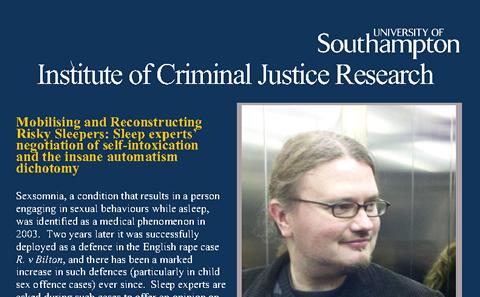"Mobilising and Reconstructing Risky Sleepers: Sleep experts’ negotiation of self-intoxication and the insane automatism dichotomy" Event

- Date:
- 20 February 2013
- Venue:
- Highfield Campus, University of Southampton
For more information regarding this event, please email Dr Gethin Rees at g.rees@soton.ac.uk .
Event details
Speaker: Gethin Rees
Sexsomnia, a condition that results in a person engaging in sexual behaviours while asleep, was identified as a medical phenomenon in 2003. Two years later it was successfully deployed as a defence in the English rape case R. v Bilton, and there has been a marked increase in such defences (particularly in child sex offence cases) ever since. Sleep experts are asked during such cases to offer an opinion on whether the suspect has sexsomnia, and to assess the likelihood of whether intercourse did take place while the suspect was unconscious, and therefore not responsible for their actions. Moreover, if the sleep expert is of the opinion that the suspect is a sexsomniac, they are then asked to assess whether the episode in question was triggered by an “internal” (arising from some ongoing or sporadic disturbance from within the individual’s body or psyche) or “external” (intoxication via drugs or alcohol for instance) cause. Testing for whether a sexsomniac episode was the result of intoxication (or was in fact a forgotten sexual act the result of alcoholic blackout) has become a contentious and controversial question in sleep expertise and has played out both in the courtrooms of the General Medical Council as well as in the trial of Zach Thompson. In this paper I will discuss the controversy surrounding alcohol provocation and the effects that this is having with regards the personnel involved in English rape trials where sleep is used as a defence.
Speaker information
Dr Gethin Rees,Lecturer in Criminology, University of Southampton